多くの米国民が無宗教となりつつあるが、宗教分布の反対側では大きな変化が起きている。現在、自らを「新生した」(ボーン・アゲイン、神のもとに立ち返って新しく生まれ変わる経験を持つこと)と言う人が、過去30年では見られなかったほどに増えている。
[toggle]Just as more Americans are becoming religiously unaffiliated (“nones”), there’s another major shift happening on the other side of the religious spectrum. More people today say they are “born again” than at any point in the past three decades. [/toggle]これは思いがけないことだ。米国民の大部分が宗教から離れているというのに、一方では、「信仰を表明するのに熱心」と自らを捉えているというのだから。キリスト教のさまざまな教派を見渡すと、(福音派だけではなく)米国民は、「あなたがたは新たに生まれなければならない」(3:7)というイエスの呼びかけに応じているのだ。この用語が彼らの教派的伝統になかったにもかかわらず。
[toggle]It almost seems counterintuitive. While significant portions of the country jettison religion, others are increasingly identifying with a more devout expression of the faith. Across segments of Christianity—not just evangelical Protestants—Americans are heeding the scriptural call that “you must be born again” (John 3:7), even when the label has not historically been part of their faith traditions. [/toggle]何十年にもわたって人口統計学者は、「新生」の自己認識について調べてきた。総合的社会調査(GSS)は、「新生した、または新生の経験がある、つまりキリストに自らを献(ささ)げると決めた転機があると言えるか」と調査対象者に聞く。
[toggle]For decades, demographers have measured born-again identity. The General Social Survey (GSS), asks respondents, “Would you say you have been ‘born again’ or have had a ‘born again’ experience—that is, a turning point in your life when you committed yourself to Christ?” [/toggle]全調査のうち、「新生した」と答えたのは、1988年の初調査では36%だけだった。GSSの調査でこの質問がその後なされたのは、2004年までは散発的だったが、その後は「はい」という答えが増えてきたので、隔年で聞かれるようになった。過去14年間で、新生した米国民は41%に増え、有色人種の間ではもっと高い(54%)。2010年から、有色人種の少なくとも半数は、キリストに従うと決めた時が「人生の転機」だったとした。
[toggle]Just over 36 percent of the entire sample said that they were born again in 1988, the first year the question was asked. The question appeared sporadically on the GSS until 2004, when it became a part of every bi-annual survey as the number of affirmative responses began to rise. In the last 14 years, the share of born-again Americans has risen to 41 percent, and much higher (54%) among people of color. Since 2010, at least half of people of color say that they have had a “turning point in their life” when they committed themselves to Christ. [/toggle]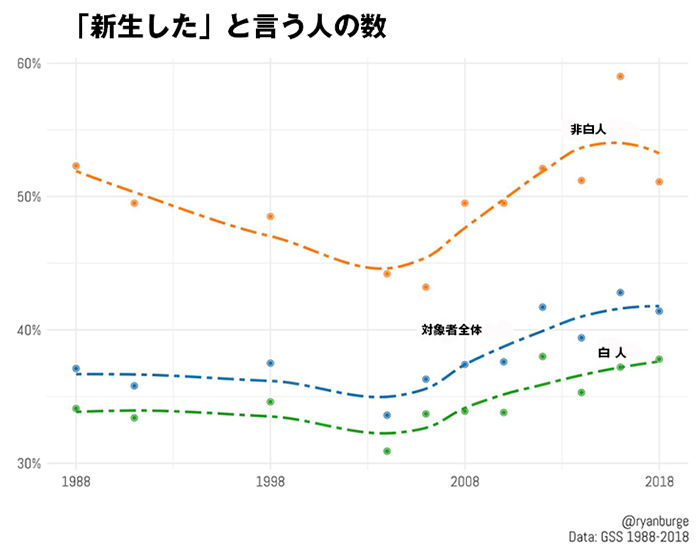
新生したクリスチャンの増加が続くということは、米国内で福音派が増え、「新生した」とはなかなか言わない主流派の人口が減ったと思う人もいるだろう。しかし実際のところ、すべての伝統的なクリスチャン(主流派もカトリックも)の間で、自らを「新生した」という人が増えているのだ。
[toggle]Some might assume the continued rise of born-again Christians reflects the steady portion of evangelical Protestants in America, while mainline Protestants, who are less likely to call themselves born again, have undergone more rapid decline. But actually, across all Christian traditions—even mainline denominations and Catholics—born-again identity is trending up. [/toggle]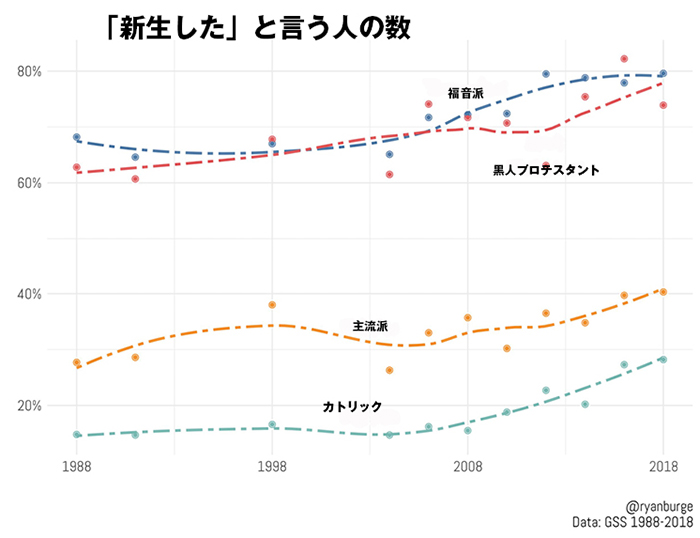
黒人プロテスタントと福音派の多くは、変わらず自らを「新生した」とし、過去30年でその数はさらに増えている。1988年には、黒人プロテスタントの5人中3人(60%)が「新生した」と答えていたが、現在それは80%になった。一方、同時期に集計した、福音派で「新生した」と答えた数は68%から78%に増えたにすぎない。
[toggle]Large shares of black Protestants and evangelicals have consistently considered themselves born again, and they’ve grown even more likely to do so over the past 30 years. While just three in five of black Protestants were born again in 1988 (60%), now it’s 80 percent. The increase for evangelicals was 68 percent to 78 percent during the same time period. [/toggle]驚くべきは主流派だ。自らを「新生した」という人が28%から40%にまで上昇したのだ。さらに「新生した」カトリックは2倍になった(14%から28%)。どちらも伝統的に信仰の構成要素として「新生」の必要性がなかったことを考えると、これらの上昇は特に著しいといえる。
[toggle]The surprise comes with mainline Protestants, who have gone from 28 percent identifying as born again to 40 percent. And the portion of born-again Catholics has doubled (from 14% to 28%). Those increases are especially striking because neither tradition teaches that a born-again conversion is a necessary component of their faith. [/toggle]福音派と見なされる特徴だった「新生」は、年月をかけて、自らが信仰において行動的だと示す方法へと進化してきたようだ。キリスト教の伝統を超え、所属教派にかかわらず、自分には「新生」の経験があるという人は、教会出席率がいい人に多い。
[toggle]Over the years, being born again may have evolved from being seen as a distinctive for evangelical Protestantism to a way to suggest that they are particularly active in their faith. Across Christian traditions, the more often a person attends church, the more likely they are to say they have had a born-again experience, regardless of their affiliation. [/toggle]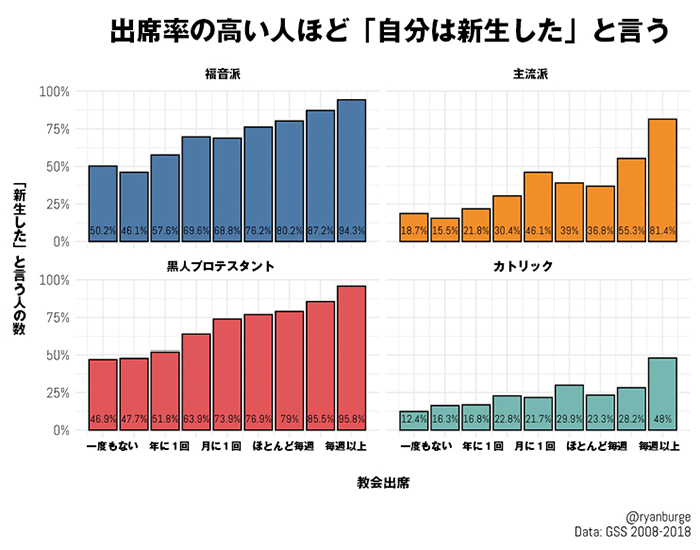
福音派と黒人プロテスタント(どちらも表の左側)では、「教会に一度も行かない」、「たまにしか行かない」という人のうち、半数が「新生した」と言ったにすぎないが、出席率がよくなると、その数は急増する。「1週間に数回、教会に行く」と回答した人のうち、およそ95%の福音派と黒人プロテスタントが「新生した」と答えた。
[toggle]For both evangelicals and black Protestants (on the left of the chart), about half who never or rarely attend indicate that they are born again, but that rises quickly with more frequent church attendance. Approximately 95 percent of evangelicals and black Protestants who attend church multiple times a week say they are born again. [/toggle]主流派とカトリックで「新生した」と言う人は全般的に少ないが、出席率の高い人ほど「新生した」と言う人が多い傾向にある。主流派では、毎週、礼拝に出席する人のうち、半数以上が「新生した」と答え、最も行動的な主流派クリスチャンの間では81・4%にまで数字は上がる。カトリックの間では、どの出席率のグループも総じて低い値だが、最後にある、毎週1回以上ミサに出席する人のうち、約半数(48%)が「新生」の経験があるとした。
[toggle]While the total share of mainline Protestants and Catholics who say that they are born again is lower across the spectrum, high attenders are far more likely to express a born-again conversion. Over half of mainline Protestants who attend once a week say that they are born-again, and the data jumps to 81.4 percent among the most active mainliners. Among Catholics, born-again identification is relatively low at almost all attendance levels save for one—nearly half of all Catholics who attend Mass more than once a week say they have had a born-again experience (48%).[/toggle]主流派とカトリックで「新生した」と答えた人は、神学的信念において、福音派と黒人プロテスタントのクリスチャンと似ている可能性があるのだろうか。データが示すのは、彼らが「聖書は文字どおりの真実」と信じていることだ。だが、保守的伝統(黒人プロテスタントと福音派)より穏健な立場を取る者(主流派とカトリック)の間には、はっきりとした見解の相違がある。
[toggle]Are born-again mainline Protestants and Catholics more likely to resemble their born-again brothers and sisters in evangelical and black churches when it comes to theological beliefs? Data shows they are much more likely to believe that the Bible is literally true. But there is still a clear divide between the more conservative traditions (black and evangelical Protestants) and the more moderate ones (mainline Protestants and Catholics). [/toggle]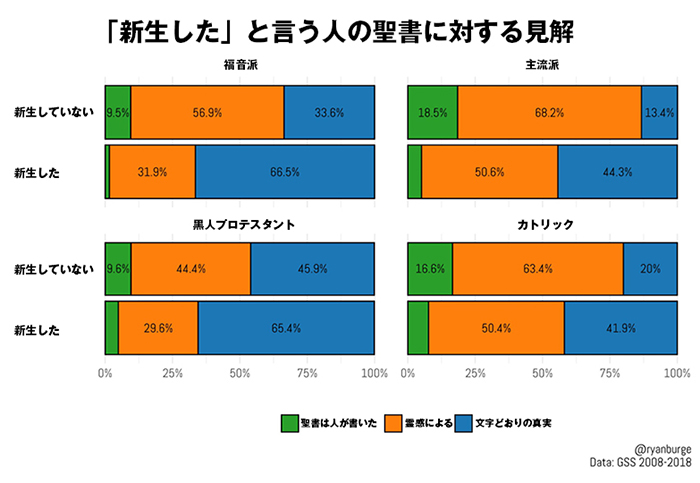
黒人プロテスタントと福音派の「新生した」という人の3分の2が「聖書は文字どおりの真実」とする一方、カトリックと主流派で「新生した」という人のうち、同じような立場を取る人は半分以下で、それぞれ41・9%と44・3%だった。ただ、「新生した」というカトリックのクリスチャンで、「聖書は真実」と信じている人は、新生体験のない人に比べて倍もいる。また、主流派のクリスチャンではこの差はもっと大きく、「新生した」という人で「聖書は文字どおりの真実」と信じている人は3倍だった。
[toggle]While two thirds of the born-again black and evangelical Protestants believe that the Bible is literally true, the share of born-again Catholics and mainline Protestants who view the Bible the same way falls at under half—41.9 and 44.3 percent respectively. A Catholic who is born-again is twice as likely to believe in a literal Bible than one who does not indicate a born-again experience. For mainline Protestants, the difference is even larger, with a born-again mainline Protestant being three times more likely to believe in a literal Bible. [/toggle]「新生」という言葉は、米国民によって少し進化しているようにも思える。多くの福音派にとってそれは、リバイバルや青年キャンプ、心を揺るがすような日曜礼拝で前に出る人の試金石となる経験だと思われていた。ところが今では、それよりもっと多くの意味を持つように考えられるようになった。ほかの信仰的伝統のある人たちには、本質的に「自分は熱心な信者だ」と言うためにこの言葉を取り入れたようだ。データが示すのは、個人がこの言い回しを用いて、「信仰が生活の中で重要な役割を果たしている」、「自分の宗教活動は、ただの社会的目的以上のものだ」と言い表しているということだろう。
[toggle]It would appear that the term “born again” has evolved somewhat among the American public. What used to be seen as a touchstone experience for many evangelicals who went forward at a revival, youth camp, or especially moving Sunday worship service, now seems to mean something more. In essence, the word seems to have been adopted by people of other faith traditions as a way to indicate that they are a devout believer. The data suggests that individuals take the term to mean that faith plays an important role in their life and their religious activity serves more than a social purpose. [/toggle]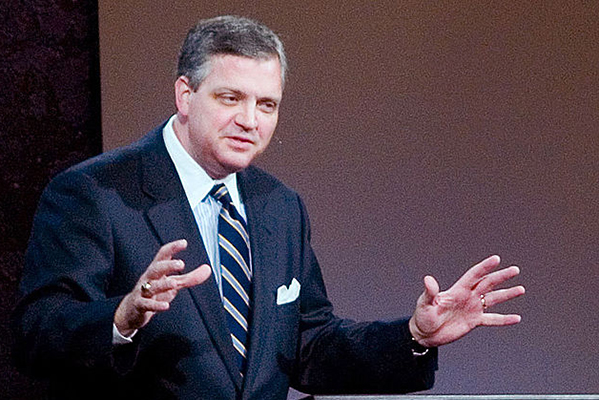
アルバート・モーラー校長(写真:james.thompson)
モルモン教徒でさえ「新生している」と答える人がいる(しかし、サンプルとなる数がGSSデータでは小さすぎて分析できない)。2年前、モルモン教が、福音派のキリスト教と自分たちの信念体系が似ているとするキャンペーン広告を打った。しかしそれは、(福音派の南部バプテスト神学校校長)アルバート・モーラーの厳しい叱責にあうこととなったが。
[toggle]Even some Mormons use the born-again label (but the sample size is too small to analyze using GSS data). A couple years ago, the Church of Jesus Christ of Latter-day Saints ran an ad campaign that implied that their belief system was similar to evangelical Christianity. It was met with a harsh rebuke from Albert Mohler. [/toggle]今後、自分たちの信仰的伝統を守り、境界線を整備するために、どれだけの福音派リーダーがモーラーに続くか見てみたいものだ。新生体験はずっと、福音派の信仰告白や「デビッド・ベビントン(英国の歴史神学者)の四辺形」(聖書主義、十字架主義、回心主義、行動主義)といった信仰の定義に用いられてきた。自ら「新生した」と言うクリスチャンがさらに多くなる中で、福音派はこれを自分たち独自のことだとしてきたが、もっと狭くて排他的な定義を用いるようにするか、あるいは同じ新生体験をした他の信者を受け入れるか、問われているといえよう。
[toggle]It will be interesting to see how frequently evangelical leaders will follow Mohler’s lead and engage in boundary maintenance surrounding their faith tradition in the coming years. For years, the born-again experience has showed up in evangelical statements of faith and definitions like the Bebbington quadrilateral. As more Christians begin to identify as born again, evangelicals who once held this distinctive will have to either form more narrow, exclusive definitions or embrace fellow believers who share the experience. [/toggle]執筆者のライアン・P・バージは、イースタン・イリノイ大学の政治科学助教授。
本記事は「クリスチャニティー・トゥデイ」(米国)より翻訳、転載しました。翻訳にあたって、多少の省略をしています。
